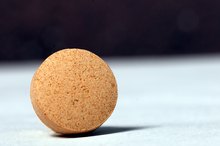Does Niacin Help With Weight Loss?
It's important to get enough niacin if you're trying to lose weight, because it helps your body convert food to energy. However, avoid getting too much, because niacin is an appetite stimulant. Niacin, a B-complex vitamin, is considered essential because it is water-soluble and your body does not store it. Therefore, you need a continuous supply through your diet.
Appetite
While many people believe that niacin intake is conducive to weight loss, niacin is actually an appetite stimulant, according to a 2010 study published by Da Li and colleagues in the World Journal of Gastroenterology. The researchers concluded that excess niacin consumption may have led to increased obesity in children in the United States.
Consumption
Foods to Eliminate If Allergic to Niacin
Learn More
The average niacin consumption per day in the U.S. is twice the recommended dietary allowance, or RDA, according to the 2010 Li study. Niacin-fortification is practiced in developed countries to prevent pellagra, a niacin-deficiency disease that leads to inflamed skin, digestive problems and cognitive impairment. Many foods, including a wide array of grains and ready-to-eat cereal, are fortified with niacin. Many animal products, which Americans consume in excess, also contain an abundance of niacin.
- The average niacin consumption per day in the U.S. is twice the recommended dietary allowance, or RDA, according to the 2010 Li study.
- Many animal products, which Americans consume in excess, also contain an abundance of niacin.
Function
Niacin is important to the health of the digestive system, skin and nerves, according to the National Institutes of Health. It also helps convert food to energy and may improve circulation and reduce cholesterol. Because it plays an important role in digestion, it may benefit your metabolism, but that does not mean that it causes weight loss. Additionally, niacin helps your body make various sex- and stress-related hormones.
- Niacin is important to the health of the digestive system, skin and nerves, according to the National Institutes of Health.
- Because it plays an important role in digestion, it may benefit your metabolism, but that does not mean that it causes weight loss.
Recommendations
Does Niacin Really Clean Your System?
Learn More
Women over age 18 should consume 14 milligrams of niacin per day, and men over age 18 should consume 16 milligrams a day, according to the Institute of Medicine's Dietary Reference Intakes. The maximum intake amount that is likely to pose no risk of adverse effects for adults is 35 daily milligrams. No evidence suggests that adverse effects can result from niacin in foods. Too much niacin from supplements can result in flushing and gastrointestinal distress.
- Women over age 18 should consume 14 milligrams of niacin per day, and men over age 18 should consume 16 milligrams a day, according to the Institute of Medicine's Dietary Reference Intakes.
- No evidence suggests that adverse effects can result from niacin in foods.
Tips
If you are tryting to lose weight or maintain your current weight, try not to exceed the recommended dose of niacin. Eat animal products in moderation and drink less coffee, which contains niacin. Skip foods that are fortified with large amounts of niacin, like ready-to-eat cereals. Exercise more, because excess niacin is eliminated through sweat. Taking one B vitamin can result in deficiency in other B vitamins, so if you choose to take a niacin supplement, take a B-complex vitamin. Take supplements only under the supervision of your health-care provider.
- If you are tryting to lose weight or maintain your current weight, try not to exceed the recommended dose of niacin.
- Taking one B vitamin can result in deficiency in other B vitamins, so if you choose to take a niacin supplement, take a B-complex vitamin.
Related Articles
References
- World Journal of Gastroenterology: Chronic Niacin Overload May Be Involved in the Increased Prevalence of Obesity in U.S. Children
- Medline Plus: Niacin
- Linus Pauling Institute: Niacin
- National Institutes of Medicine Office of Dietary Supplements. Niacin Fact Sheet for Health Professionals. Updated June 3, 2020.
- MedlinePlus. Niacin. Updated June 4, 2020.
- Boden WE, Probstfield JL, Anderson T, et al. Niacin in Patients with Low HDL Cholesterol Levels Receiving Intensive Statin Therapy. N Engl J Med. 2011;365(24):2255-2267. doi:10.1056/NEJMoa1107579
- Morris MC, Evans DA, Bienias JL, et al. Dietary niacin and the risk of incident Alzheimer's disease and of cognitive decline. J Neurol Neurosurg Psychiatry. 2004;75(8):1093-1099. doi:10.1136/jnnp.2003.025858
- Elam MB, Hunninghake DB, Davis KB, et al. Effect of Niacin on Lipid and Lipoprotein Levels and Glycemic Control in Patients With Diabetes and Peripheral Arterial Disease: The ADMIT Study: A Randomized Trial. JAMA. 2000;284(10):1263-1270. doi:10.1001/jama.284.10.1263
- Zhai G. Alteration of Metabolic Pathways in Osteoarthritis. Metabolites. 2019;9(1):11. doi:10.3390/metabo9010011
Writer Bio
Erin Beck began writing professionally in 2008 as an opinion columnist for the West Virginia University student newspaper, "The Daily Athenaeum." She has worked in health promotion at the university and as a communications intern at the National Alliance on Mental Illness. She has a Bachelor of Science in journalism and a Master of Public Health, both from West Virginia University.









